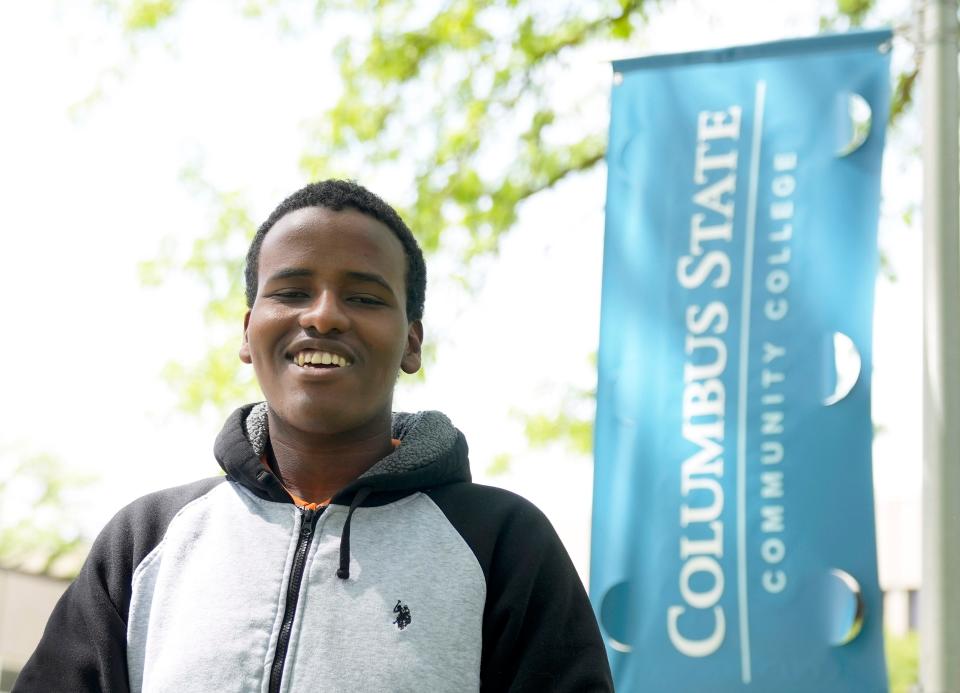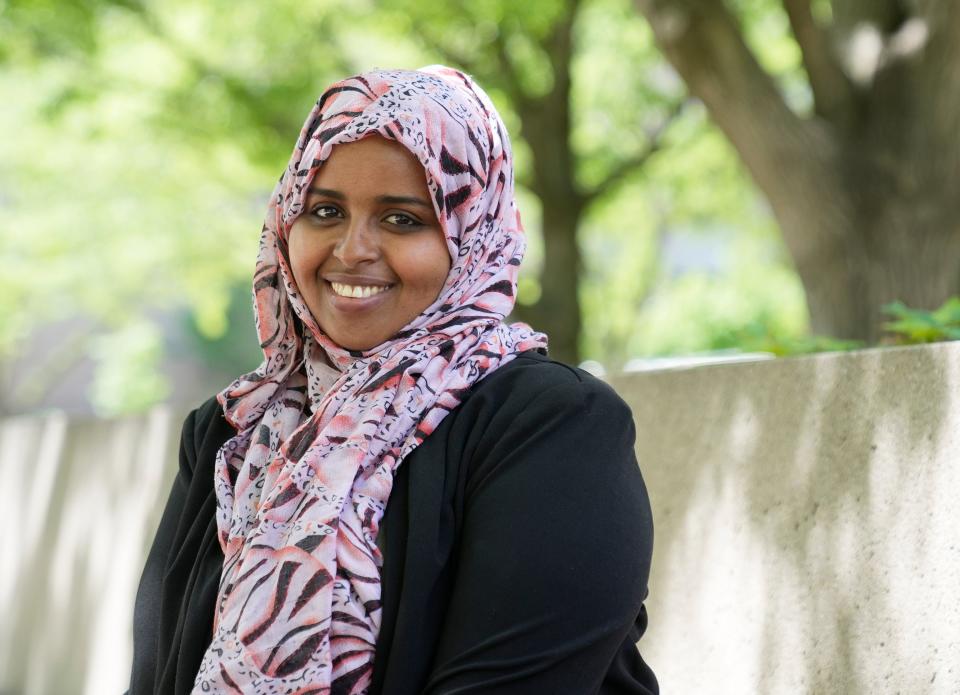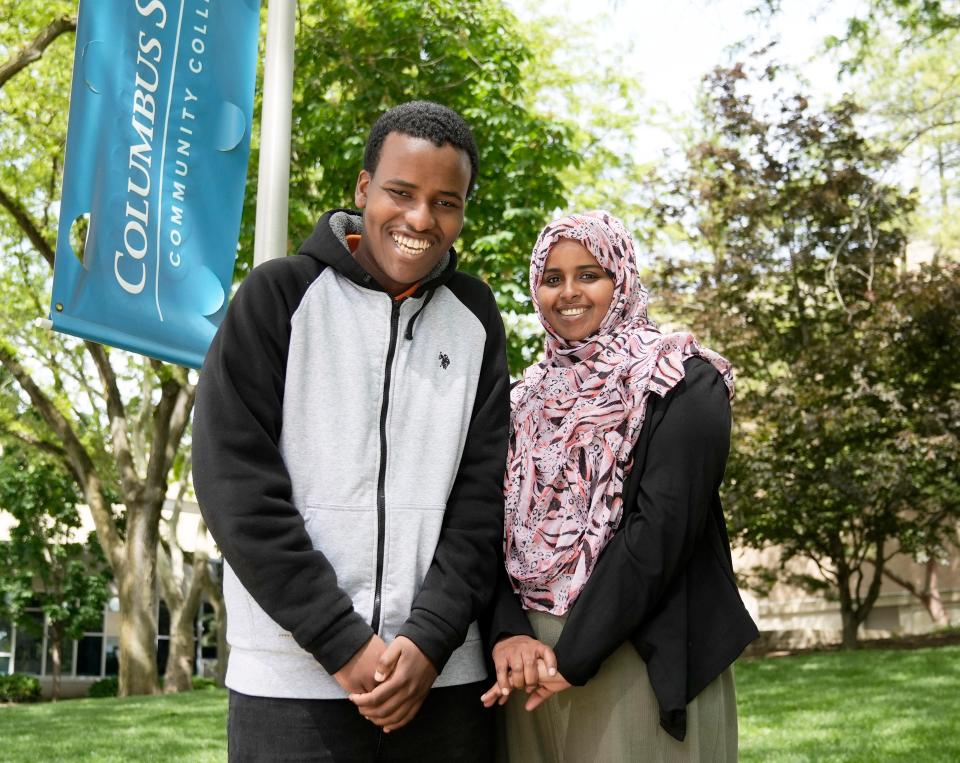From mental health crises to college apps, nonprofit helps Somali youth in central Ohio
As Jibril Ahmed walked out of his final exam — a math test — he breathed a sigh of relief.
“I think I did OK, but I’m so happy to be done,” said Ahmed, 20, cracking a wide smile outside of the Columbus State Community College library.
He is studying computer science and plans to pursue a bachelor’s degree next year at Ohio State University.

Still in the midst of his academic journey, he has already come a long way.
Ahmed fled his native country of Somalia for a Kenyan refugee camp, then moved to a new home and culture in America and lost his father — all before the age of 10. After undergoing a mental health crisis as a high schooler in 2021, he connected with the Buckeye Ranch, whose outreach workers helped him get treatment and apply to Columbus State, becoming the first person in his family to attend college.
Improving his mental health has been a big part of his academic success, he said.
“The journey taught me a lot — not to be afraid or not to be shy. Sometimes, you need to ask for help,” Ahmed said.
The Buckeye Ranch, founded in the early 1960s, offers a wide range of mental health services and support for children, youth, and families in central Ohio. Through a special outreach program funded by Franklin County Alcohol, Drug and Mental Health, the nonprofit ranch works with more than 300 young people like Ahmed in Columbus’ large Somali American community. Outreach workers assist Somali youth and their families with everything from mental health to accessing employment and housing services.
Nafisa Jamale, a community-based clinical supervisor with the program, said she has seen Ahmed and other clients make major strides.
“(Ahmed) almost gave up school. He was like, ‘I can’t do this,’” she said. “But I'm happy with what he’s accomplished … it just shows me what we can do for the community and there's hope for next generations.”

Addressing lingering trauma in the Somali community
Jamale, a licensed social worker who is herself Somali American, said many of her clients face lingering trauma, but they approach mental health with a different perspective than Western medical practitioners.
“A lot of the first generation — due to their experience in refugee camps or their parents going through the (Somali) civil war — there is a very high rate of trauma symptoms and other mental health disorders in the community,” she said.
But too often, the stigma of mental illness means problems go unaddressed, she said.
“A lot of times, Somali families are like, 'No, no, no, we're not doing medication,'" she said. “… But I find that Somali families will listen more to a Somali clinician.”
Jamale and her teamwork with families to find solutions that work for them, she said. If clients do need medication, the team helps the family monitor for side effects and follow up.
Kamilah Twymon, the Buckeye Ranch’s vice president for community-based and education services, said the team is lucky to have many Somali American staff, who understand not only the language but also the cultural background of their clients.
“Nafisa is our first supervisor that is Somali. … We're incredibly proud of that, and she has done an amazing job at bridging that gap,” Twymon said.

Multi-system therapy helps youth confront mental health issues together with families
In 2021, Ahmed, then a student at Horizon Science Academy Columbus High School, had a mental health crisis that required his mother to call the police. He was taken to Nationwide Children’s Hospital for treatment, which, in turn, referred him to the Buckeye Ranch’s Somali outreach program.
Ahmed received multi-systemic therapy, a program where mental health professionals conduct regular home visits, helping youth and their families deal with any problems as a family unit.
The workers helped Ahmed learn social and emotional skills, including breathing techniques and other ways to deal with negative emotions, Jamale said.
Recognizing Ahmed had a desire to keep learning, they also helped him apply to colleges and seek financial aid. This is something that his mother, who is not fluent in English, would not have been able to do, according to Jamale.
Once Ahmed got in into Columbus State, Buckeye Ranch staff helped him find an after-school job, get extra tutoring, and even what COTA bus route to take between campus Downtown and his home in Northland.
Two years later, Ahmed now walks around campus — where he used to get lost — with confidence. He said he will miss Columbus State once he moves on to Ohio State University.
After finishing his computer science degree, he hopes to one day start his own cybersecurity company.
“That's one of the highest in-demand jobs in the country,” he said. “… I am also thinking about creating an app that could help people (access aid) with natural disasters.”
Jamale said she and Ahmed have become friends over the years, and his academic success inspires her.
“With Buckeye Ranch — and I’m not saying this because I work here — but I think we are really educating and helping a lot of families come forward to seek further help,” she said.
Ahmed agreed.
“Mental health wasn't easy for me. … It was a very difficult journey for me and my family," he said. "But (Buckeye Ranch and its resources) were there and supporting every step of the way.”
Peter Gill covers immigration, New American communities and religion for the Dispatch in partnership with Report for America. You can support work like his with a tax-deductible donation to Report for America.
This article originally appeared on The Columbus Dispatch: Buckeye Ranch helps Somali youth with mental health, college apps

